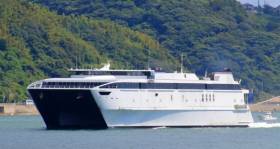Displaying items by tag: High Speed Craft HSC
You Can take the 'Jonathan' Out of Dublin But Not the 'Swift'
#FerryNews - Dublin Swift, the marketing name Irish Ferries use for Jonathan Swift which has been sold to Spanish operators, has been put to use again albeit as the new name given to a replacement high-speed craft, writes Jehan Ashmore.
The sucessor HSC, Westpac Express is to take on the name Dublin Swift at Harland & Wolff's Belfast Dry Dock, having entered the facility yesterday afternoon. The HSC had been on charter to the US Military Sealift Command since Irish Ferries parent Irish Continental Group (ICG) acquired the craft in June 2016. The craft had been flagged to the US but has changed to Cyprus.
The vehicle carrying catamaran HSC built by Austal Ships Pty, Fremantle, western Australia, to their in-house 101m Auto-Express design was redelivered to ICG at the end of November 2017.
Afloat has monitored HSC Westpac Express since arrival in Belfast Port two months ago, having made a stopover call to Holyhead. Invariably, this involved berthing trials prior to taking up service with a scheduled introduction on the Dublin-Holyhead route in April.
On arrival in Belfast, the 2001 built HSC berthed at H&W's Ship Repair Quay adjacent to Belfast Dry Dock to undergo internal refurbishment and maintenance. Work continues to convert the HSC from military requirements (included armoured vehicles) to civilian use. This will enable a refurbishment programme to bring the craft up to Irish Ferries standards.
When Dublin Swift enters service next month, the HSC will bring increased capacity on the Dublin-Holyhead route in partnership with Ulysses. The flagship which is also Cypriot flagged operates with the chartered-in ropax Epsilon which provides more freight-orientated capacity.
The charter of Epsilon will expire in November this year, though ICG has two further one-year options on the Italian flagged 'no-frills' marketed ferry which also serves at weekends on Dublin-Cherbourg round-trips.
Epsilon had previously occupied Belfast Dry Dock for refit. On completion, the ropax resumed service last month albeit with a delayed sailing, firstly on the France route. This was followed by weekday operated sailings on the Wales route.
Jonathan Swift in 1999, became the first fast-craft ferry for Irish Ferries. The custom-built HSC having made the delivery voyage via the Suez Canal from the same Austal yard but based on their 86m Auto-Express design. Due to the marketing name (painted on the hull: see story) of the craft for almost the past two decades, the fastferry has also became known as the 'Swifty'.
In more recent years, HSC Jonathan Swift, became the last fast-ferry remaining on Ireland-UK services, with exception albeit of seasonal operated sailings linking the Isle of Man. It was during the 1990's that the heyday of fast-ferries made their presence on the Irish Sea, in particular services through Belfast.
Dublin Swift's most direct rival came in the form of the High Speed Sea-Service (HSS) Stena Explorer until the Dun Laoghaire-Holyhead route closed with the final season ending in 2014.
The move by Stena Line to abandon the route led to the operator consolidating existing services on the Dublin-Holyhead route that began in 1995. Currently, sailings are by Stena Superfast X while routemate, Stena Adventurer is also in dry-dock for annual refit overhaul. Taking on relief duties is ropax Stena Horizon.
























































